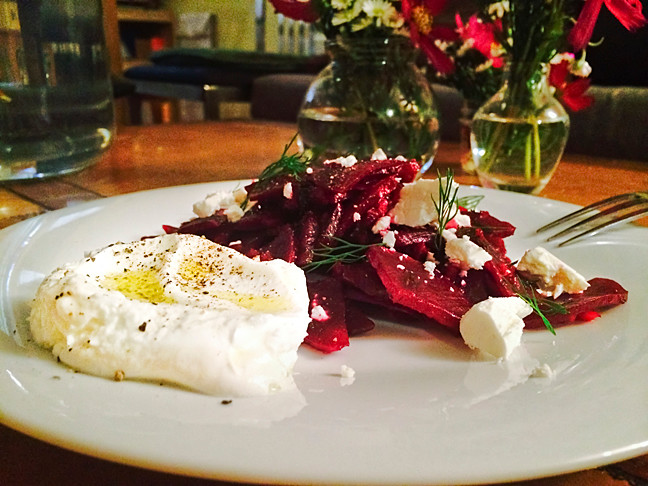Beat hunger the healthy way with Ziva’s beet salad
Personal chef Ziva Ophir recently joined me in the kitchen to prepare a balagan (Hebrew for “mess”) Shabbat dinner of dishes that come from a spectrum of traditions. We made a spicy Morrocan Swiss chard dish, Iraqi stewed okra, Persian rice, her old neighbor Hannah’s beef-stuffed eggplant and my favorite, Ziva’s mother’s beet salad. The dinner was a great representation of a rich Jewish Diaspora, with a personal touch.
As she taught me how to make each dish, there were memories about each source. For example, Ziva, whose parents came from eastern Europe, looked back to remember how Hannah helped her discover foods and dishes of the Middle East. This opened her world up to spices and unusual ingredients her own mother never cooked with.
Hannah also happened to be the only neighbor in her community with a telephone. The people in their schunah (“neighborhood”) were so connected that they would give out Hannah’s number to friends and family members in case they needed to be in touch. People depended on their neighbors for food, for friendship and for help.
The mere fact the many families didn’t have phones during the 1960s gave me some insight about the development of Israeli culture in its early years. If you wanted to talk to someone, you had to go knock on her door. If you wanted to exchange stories about your day, you’d have to walk to down the street or even a few miles away to check in.
On the flip side, you always had to be ready for guests. When I think about Middle Eastern hospitality, there’s not only a bounty of food offered, but there is always a readiness to entertain. Most people even nowadays have cake, cookies or tea ready to serve in a snap. Heaven forbid someone come over and you couldn’t feed him or her. It only occurred to me through Ziva’s sharing that Israeli spontaneity was somewhat rooted in how community members had to communicate in order to connect with one another. Ziva and I passed the day in my kitchen, exchanging memories and cooking techniques.
My favorite recipe was her mother’s beet salad, perhaps the best I’d ever had. On the Seder table, beets represent freedom, more specifically, a wish for freedom from those who wish us harm. In sharing Ziva’s beet salad, I wish the Jewish community of Riverdale and Jews living across the world this hope of freedom, peace and sweetness. L’shanah Tovah!
Ziva’s beet salad
Her mother’s recipe, now hers, this bright fuschia salad makes a wonderful addition to any dinner table. The only caveat is that Ziva omitted sugar from her mother’s original list of ingredients. Make it a day or two ahead and garnish with fresh dill. The next day, I made a great lunch using leftover beets, crumbled French feta, chopped dill and a dollop of plain yogurt with lots of freshly cracked pepper.
3 bunches of medium to large red beets, stemmed, washed and scrubbed
1 red onion, very finely diced
1 cup freshly chopped dill
1/3 cup canola or vegetable oil (do not use olive oil)
1/3 cup tap water
1/3 cup distilled white vinegar (we used Heinz)
Fine sea salt, to taste
Fill a large pot with the beets and cold water. Bring to a boil and cook over a light boil until just tender. Use a tooth pick or a cake taster. The beets should be easily pierced, but still firm.
Drain and allow to cool. Peel the beets, and quarter lengthwise.
Using a sharp knife or mandoline, slice the quartered beets crosswise thinly into triangular shaped pieces.
Combine the beets, dill and red onion in a large bowl.
Whisk together the oil, tap water and vinegar. Dress the beets and season with salt.
Marinate at least two hours or up to two days in the refrigerator. Serve garnished with extra chopped dill.
For more food ideas or to follow Danielle’s culinary journey, add her on instagram @DanielleRehfeld.






